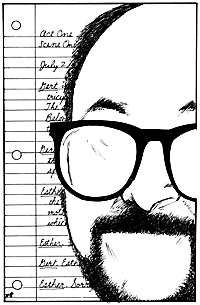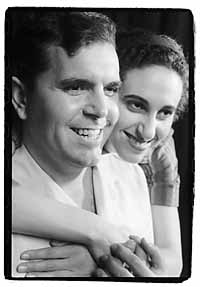Family Man
By Robert Faires, Fri., Feb. 26, 1999
|
|
In a way, though, this makes sense. This was the side of Cohen's theatrical life that Austinites knew the least well. After all, from his coming to Austin in 1991 to his passing almost seven years later, only one of Cohen's plays received a full production locally: Baby Grand, the 1983 drama that was staged by UT shortly after Cohen moved to the city. A couple of other works were given staged readings, but that was as close as they got to being produced. Despite his having a catalog of proven scripts -- among them, Tanglewood and Friends Indeed, both produced Off-Off-Broadway, and Piaf --A Remembrance, produced on Broadway -- and despite his prominent position at UT and position as Resident Playwright at Capitol City Playhouse for a couple of seasons, David Cohen the playwright was all but an unknown entity to Austin theatregoers.
That changes this week, as a second script by Cohen is given a full production on an Austin stage. Nantasket, a drama set during the polio scare of the Fifties and Cohen's last fully developed play, opens Friday for a two-week run in the Theatre Room of the Winship Drama Building on the UT campus. This posthumous effort, staged by Cohen's friend Christina Moore, is the Theatre & Dance Department's memorial gesture to the man who did so much to energize its playwriting program and encourage its developing writers. And a worthy gesture it is, too, especially considering how much effort Cohen expended trying to get the play produced locally and how close he came several times to seeing it staged -- by Cap City, by Script Works, and by UT -- only to have the production plans fall through before it could make it onto a schedule. It's the play he most wanted Austin to see. It's the play Austin should at last have the chance to see.
Just reading Nantasket, you can glean something of what the playwright was driven to share with an audience. There is a deeply personal quality that comes through in the way Cohen sketches out the era of his youth, from his careful description of the beach cottage shared by the Goldstein sisters and their respective husbands and kids to the inclusion of specific pop ballads and big band hits -- Jo Stafford singing "You Belong to Me," the Harry James band playing "I've Heard That Song Before" -- to the references to streets and even blocks of streets in little seaside Massachusetts towns so detailed even a stranger might follow them and get from one place to the next. This has the feel of something more than an imagined world; the texture is lived in, and it brings us more deeply into the lives of these characters. Whether or not the figures on the page are drawn from life I don't know, and in the end, it doesn't matter; the reality in which they move is complete enough to make their dilemmas, their decisions, as real as they need to be. We can taste the salt in the air, we can feel the closeness of the summer heat, we can smell the fear of polio, and from them we can grasp the desperation of a mother who will risk all to save her child from the disease's crippling grip. That terrible gamble, a gamble that hedges all the dreams of a difficult past against a better future, is the stuff of compelling drama, and it's no wonder that a playwright who managed to articulate that on the page should want to see it breathed into knotty, gripping life on the stage.
Moreover, Nantasket makes a fitting companion piece to Baby Grand. If those of us in Austin are to know David Mark Cohen the dramatic writer through only these two works, they are works which share enough thematic and theatrical qualities to give us a sense of the playwright we lost when we lost David Cohen.* Both plays center on adult siblings living together who face a decision that will affect their future and the future of their family. In Nantasket, the siblings are sisters who must choose whether or not to inject their children with the new polio vaccine developed by Jonas Salk, a vaccine that may have been responsible for a dozen deaths. In Baby Grand, they are brothers at odds over continuing the legacy of their dead father, a world-renowned concert pianist; one has already rejected a career in music, the other wants to pursue it. What they choose to do will determine whether they live together or apart, whether they honor the past or discard it, whether they accept what has gone before, however painful it may be, or continue to live a life of bitter denial. In both stories, dreams have died -- and died hard, usually at the hands of a family member. Cohen recognizes the singular bond that joins family member to family member and the unparalleled strength of feeling it can inspire, like an electrical current through a conductive metal. In these plays, to be betrayed by a family member is to be cut so deep that the wound may not heal, even in a lifetime. It's part of what raises the stakes for Cohen's characters. Their splits are the severing of blood ties, sacred ties, after which nothing can be the same as it was. Their resolution of those divisions, if they can be achieved, are the restoration of blood to blood and a reconnection to not only one family member in the present but to the generations of the past -- to traditions, to history, to roots.
|
|
There is another sense in which the past, history, traditions, carry meaning in Cohen's plays: His protagonists are Jews, and while they may be American and to varying degrees secularized, removed from their ancestors' way of life, most feel their Jewishness and work to keep it intact. Baby Grand's Sam anxiously petitions his brother to go with him to their Aunt Esther's for Rosh Hashanah. Nantasket's Gert and Esther josh about the bloodline of their little sister Rachel's fiancé Brad. Both scripts are liberally sprinkled with Yiddish and Hebrew, with references to tradition, with injunctions to remember. As with the details of the Massachusetts shore, these qualities ground Cohen's work in a world that works on us. We can grasp the lives of these characters, what is important to them, essential to them, and as we take hold of those things, the difficulties they face are all the more affecting. They have become our difficulties, shared as if we are part of their family. Cohen brings us into the brood, to be his brother, his sister.
If all this seems somehow familiar -- naturalistic settings, blood ties, familial discord, past versus future, Jewishness -- it should. This is the same territory worked by one of the nation's finest playwrights, Arthur Miller. That Cohen is following in his footsteps should be of little surprise; he came of age at a time when most aspiring dramatists sought to be either the next Arthur Miller or the next Tennessee Williams. Obviously, his background was more in tune with Miller's, and in exploring it, he found it to be as fertile for the harvest of dramatic narrative as his great predecessor. That places Cohen in an honorable line of American dramatists, writers whose intimate, naturalistic portraits of family life expose the deepest chamber of our hearts and touch us there. Alas, such dramas are not as much in vogue as they were in Miller's heyday. Even the Great Man himself has trouble getting his newer work produced. To some, it seems old-fashioned. And so may Cohen's work appear to some audiences. But then, look at what is currently packing them in on Broadway: Death of a Salesman. A tale of family conflict, of dreams that have died and last gasps for a better future, can still move us, confronting the pain of the past, can still speak to the way we live. As it is with Miller, so it may be with David Mark Cohen. He is still a playwright worth getting to know.
Nantasket runs Feb 26-Mar 7 in the Theatre Room of the Winship Drama Building, UT campus. Call 471-1444 for info.










